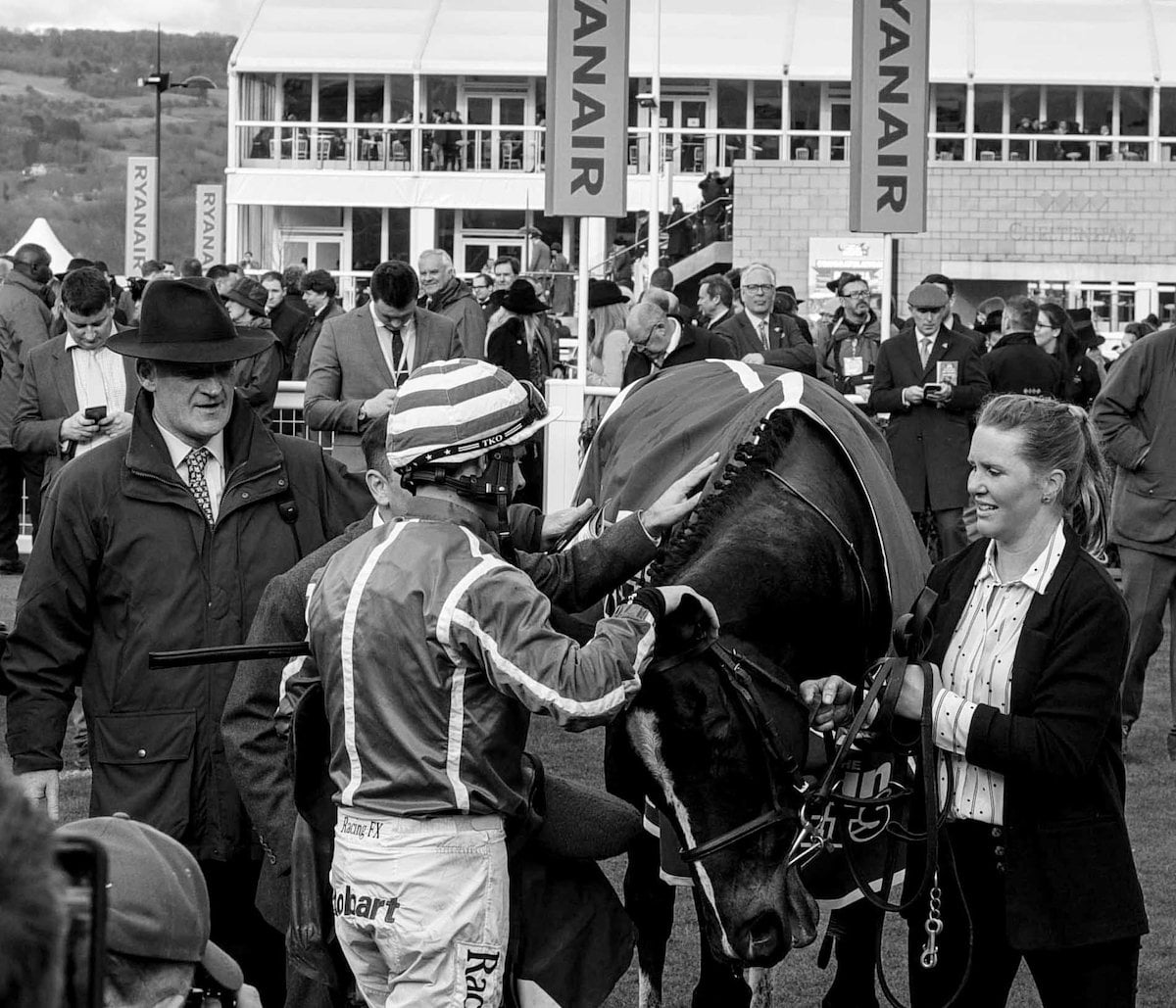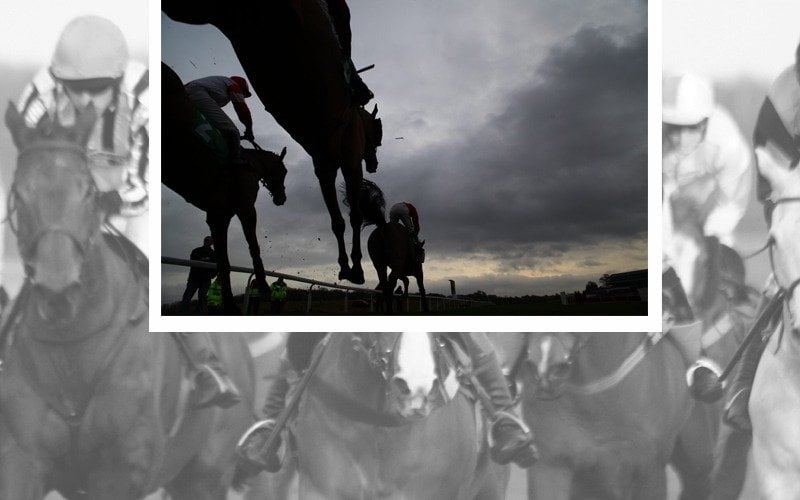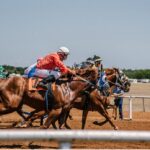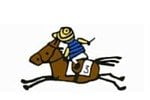
The Cheltenham Festival is famed for its great races won by great horses, but for Ladies’ Day Sara Waterson celebrates a selection of the great women who have made their own mark on Jump racing’s most elite occasion.
HENRIETTA KNIGHT
Trainer ‘Hen’ Knight, a prolific winner of Point-to-Points from 1984, took out a full licence to train under Rules in 1989 from her Oxfordshire base at West Lockinge. With a background in eventing, during those years she also served as Chairman of the Horse Trials selection committee for the Seoul Olympics.
Married to former jump jockey Terry Biddlecombe, Henrietta and her unlikely spouse will always best be remembered at Cheltenham for their three wins in the Gold Cup with the ill-fated Best Mate, winner of six Grade 1 Chases, whose third Gold Cup equalled the record of the legendary Arkle. Her record there between1997 when she won the Stayers’ Hurdle with Karshi until ‘Matey’s’ third Gold Cup in 2004 was however second to none.
The Knight-trained 2000 Champion Chaser Edredon Bleu (also running in the familiar blue and burgundy stripes of owner Jim Lewis) was just as popular at Cheltenham as Best Mate, winning the 1998 Grand Annual before his Champion Chase victory in millennium year; he also took the King George at Kempton in 2003, emulating his stablemate’s win in 2002, in a long and gilded career.
Hen’s other Grade 1 winners are: Lord Noelie who took the Royal & Sun Alliance Chase 2000, Maximise winner of the Feltham Novice Chase in 2001, and El Vaquero who won the 2005 Scilly Isles Novice Chase. Her most recent Cheltenham Graded win was with Calgary Bay in the 2009 Grade 2 Dipper Novice Chase; and the trainer has won at Grade 2 level more recently with Somersby. She also boasts eight wins of Huntingdon’s Grade 2 Peterborough Chase between 1998 and 2007, four of those in consecutive years with Edredon Bleu
Photograph courtesy of racingfotos
JENNY PITMAN OBE
Jenny Pitman began her training career as a ‘Permit Holder’ with Point-to-Pointers. She was granted a full licence in 1975, when still married to leading NH jockey Richard Pitman. Her first winner that December was the grey Biretta. Women still then formed a small minority in the training ranks, and faced a lot of prejudice not least in finding good owners, but she quickly aimed for the top.
Jenny’s first Grand National runner in 1977 only her second season as a licensed trainer was The Songwriter, owned by showbiz composer Peter Callander. In subsequent seasons she won every top steeplechase in the calendar, and was the only trainer other than Martin Pipe to achieve the ‘full house’ of Grand Nationals – Welsh, Irish, Scottish, and Midlands as well being the first woman to win the Aintree spectacular with Corbiere in 1983, a feat she repeated in 1995 with Royal Athlete. It’s not often remembered that she also ‘won’ the famous void National in 1993 with Esha Ness. She was subsequently tireless in travelling the country with Corbiere to promote the famous but threatened race, and was instrumental in helping to save Aintree for a grateful racing public.
The year following Corbiere’s ground-breaking Grand National win, Jenny notched up another memorable record, being the first of her sex to train the winner of the 1984 Cheltenham Gold Cup with the increasingly fragile Burrough Hill Lad – a wonderful feat of skill with any horse, let alone one so hard to keep sound as him. He was duly voted Horse of the Year but was unable to defend his title in the following seasons due to injuries. In 1991 however, Jenny’s latest stable star Garrison Savannah won her a second Cheltenham Gold Cup, piloted by her son Mark.
The trainer’s other Cheltenham victories include the 3m Festival Trophy (then the Ritz Club National Hunt Handicap, now sponsored by the Steward family) Gainsay 1987; the Sun Alliance Chase (now the RSA Chase) Nathen Lad 1996; the Supreme Novice Hurdle, Indefence 1996; and the Stayers Hurdle (now the World Hurdle) Princeful 1998.
Jenny’s awards include the Golden Spurs Racing Personality of the Year 1983, Cwlth Sports Awards 1983 and 1984, Piper Heidsieck Trainer of the Year 1983–84 and 1989–90, Variety Club of GB Sportswoman of the Year 1984, Golden Spurs Racing Personality of the Year 1983 and Best National Hunt Trainer 1984
Jenny’s success was achieved in the face of many years of severe ill health, for which she was given the inaugural BBC SPYA Helen Rollason Award for achievement in sport despite adversity. Following a bout of cancer she announced her impending retirement to a shocked media and public at the 1999 Cheltenham Festival. Her final runner was King Of The Castle, winner of that season’s Aintree Bumper.
Famous for her blunt language and straight dealing, in 1998 Jenny was deservedly awarded the OBE for her services to racing, the only woman to be so honoured. She has since become a successful author of crime novels with a racing theme.
JESSICA HARRINGTON
Jessie, who trains in Ireland, will always be remembered for her brilliant handling of Moscow Flyer, three-times winner of the Champion Chase at The Festival. Another with a successful history of event riding, she took out a permit in 1989, graduating to a full licence in the early ’90s and notching up her first graded success in the 1994 Galway Hurdle with Oh So Grumpy.
Space Trucker was Jessie’s first Cheltenham winner in 1999 taking the Grand Annual, but it was Moscow Flyer’s win in the 2002 Arkle which really got the Harrington bandwagon rolling. The great 2m chaser won an incredible 27 races from 45 starts, ending with a fairytale win in the Punchestown Charity Race piloted by Jessica’s daughter Kate. In between he won the 2002 and 2004 Champion – he won when he ‘stood up’ but was prone to the odd careless error – taking Sandown’s Tingle Creek in between.
Other Cheltenham Festival wins, to add to her many wins at top level in Ireland over jumps, include the 2003 Grade 3 County Hurdle with Spirit Leader, and – perhaps uniquely – the Champion Bumper in successive years 2006/07 with Cork All Star.
More recently Jessie’s Commonstown yard has been making a name on the Flat, with the likes of Curtain Call and Jumbajukiba, gaining their first Group 1 in 2010 with Pathfork.
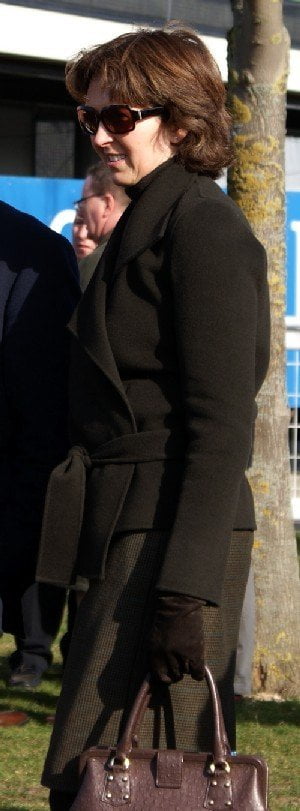
VENETIA WILLIAMS
Venetia was an amateur National Hunt jockey but retired after suffering a broken neck in 1988. After stints with trainers Martin Pipe and John Edwards she took out a licence to train under Rules in 1995.
The only woman since Jenny Pitman to train a Grand National with Mon Mome, winner of the 2009 running, she also trained him to place 3rd in the 2010 Cheltenham Gold Cup.
Previously her best known horse was the grey chaser Teeton Mill, winner of the Hennessy Gold Cup and King George VI Chase in 1998, and the mare Lady Rebecca, winner of thirteen of her nineteen starts. These include eight Cheltenham hurdle races, three of those being consecutive Grade 1 Cleeve Hurdles at the January meeting from 1999 to 2001.
Other notable wins include Golden Goal taking the Grade 1 Scilly Isles Novice Chase and the Grade 2 Pendil Chase in 2002 before his untimely demise early in 2003. Venetia’s 2009 Cheltenham Festival was notable: on Ladies’ Day she saddled Something Wells to a win the Festival Plate, and also trained the second placed; earlier she’d won the Pertemps Final Hurdle with Kayf Aramis.
JOAN MOORE
Joan Moore, 2010 award nominee for the ‘the outstanding contribution made by a lady to jump racing’, is possibly unfamiliar to UK racegoers, but she’s well known to Irish NH fans as matriarch to a jump-racing dynasty. Married to the late trainer Dan Moore, mother of trainer Arthur Moore, and mother-in-law of Tommy Carberry, she’s perhaps now most famous as the grandmother of jockeys Paul, Philip and Nina Carberry.
Joan however deserves the accolade in her own right. A lynchpin of her husband’s team which produced fourteen Festival winners including the great L’Escargot, winner of the Cheltenham Gold Cup in 1970 and 1971, she was later trainer in all but name during the years he was laid low with serious illness. It was Joan who from 1978 supervised the training of the unlucky Tied Cottage, a multiple winner at Cheltenham including of his debut race, the 1976 Sun Alliance Chase. Tied Cottage, a bold front runner who was 2nd in the 1977 Gold Cup and fell in the two subsequent years, winning the Irish Grand National in 1979. At the age of 12 he led the field a merry dance, passing the post first to win the 1980 Gold Cup by eight lengths, only to be disqualified on a technicality, due to traces of a banned drug accidentally ingested due to contaminated feed. His last race at Cheltenham was an honourable fifth place in the Foxhunters’ at the age of 15. Another of Joan’s boldly front-running charges was Delmoss, a standing dish in early 1980s Grand Nationals.
Joan was subsequently the first woman to become a Steward of the Irish National Hunt Steeplechase Committee, and was an extremely effective Manager of Punchestown Racecourse.
LADY CHICKY OAKSEY
The judges of the inaugural 2008 Cheltenham Festival award for ‘the outstanding contribution made by a lady to jump racing’ found it impossible to choose between Lady Chicky Oaksey and Ann Saunders, Company Secretary of the Professional Jockeys’ Association, making them joint winners for their indefatigable work on behalf of jockeys past and present.
Lady Oaksey is the Senior Almoner of the Injured Jockeys Fund, heading a team of eight. Following the paralysis of two jockeys in the 1963/64 season at Aintree the IJF was co-founded by her husband, the former the Champion Amateur who rode as John Lawrence. Lord John is now the current President, and he and Chicky have long been seen manning the IJF stall at race meetings up and down the country. At Cheltenham they’ve been a familiar sight in the autumn, selling the wildly popular IJF Christmas cards and diaries to racegoers appreciative of the high risks of the profession.
Chicky’s work as Senior Almoner is less visible but far more demanding. It is she who supervises and organises liaison with beneficiaries of the fund, a sensitive and demanding role involving endless personal visits for assessment and pastoral care, consulting with her team, reporting to the Trustees, and recommending where the charity’s money should be spent.

NINA CARBERRY
Nina Carberry was born on 21 July 1984 into a famous Irish racing dynasty: father Tommy rode the 1975 Grand National winner L’Escargot, subsequently training Bobbyjo for a famous victory in 1999 with Nina’s brother Paul in the saddle. A third sibling Philip is also a jump jockey and all three have now won the Irish Grand National following Nina’s victory in 2011.
Nina’s first winner was on the Flat at the age of 16: Sabrinsky carried her to victory in the prestigious Ladies’ Derby at the Curragh on 15 July 2001. She has since been recognised as probably the best woman rider ever in National Hunt racing, commanding universal respect.
Not all NH races under Rules are open to amateurs but for those which are, Nina’s services have been much in demand over jumps as well as on the Flat. Known for her finesse with young horses, she regularly rides in Pro/Am Bumpers for leading trainer Noel Meade in Ireland, as well as serving as regular jockey for Enda Bolger who trains a number of Cross Country specialists for leading Irish owner JP McManus.
Nina’s riding career really took off in the 2004/05 season, which resulted in 12 winners under National Hunt rules in Ireland and Britain. In 2005 she became the first woman for 18 years to ride a winner in a race open to professional jockeys at the Cheltenham Festival, when partnering Dabiroun trained by Paul Nolan to win the inaugural running of the Fred Winter Juvenile Novices’ Handicap Hurdle. In both 2006 and 2007 she won the Grade 1 Championship Bumpers at the Punchestown Festival.
Since those landmark victories she has become best know as the queen of the Cross Country Chases, winning or placed in most renewals on Bolger-trained horses for JP McManus at both Punchestown and Cheltenham, Her Festival wins in the Cross Country at Cheltenham came on Heads Onthe Ground in 2007, and notably on Garde Champetre in 2008/09, Nina winning eight races in all with the gelding.
One of only four women to have completed the fearsome Grand National course and the leading lady rider of the Cheltenham Festival with fiver wins, in recognition of the glamour and excitement she has brought to the Festival Nina was short-listed in 2008 for Cheltenham’s ‘Outstanding Contribution made by a Lady to Jump Racing’ award, winning this prestigious accolade outright in 2009.
Photograph courtesy of racingfotos.

KATIE WALSH
Katie Walsh, Nina’s best friend and sister-in-law (Nina is married to Katie’s brother Ted), is equally steeped in Irish jump racing.
Daughter of former jockey and now trainer Ted and sister of Ireland’s Champion NH Jockey Ruby, she burst onto the Cheltenham scene on the second day of the 2010 Festival with a famous double. In the opening just Holding off Nina in a thrilling finish to the big Amateurs’ race, the NH Challenge Cup Steeplechase, on Poker De Sivola – for which both determined jockeys received a ban for whip use – Katie subsequently piloted Thousand Stars to victory in the ultra-competitive Country Hurdle, giving her a Festival record of two wins from two rides.
Ruby and Katie thus become the third brother-and-sister to win at the Festival (their sister Jennifer is their agent, just to keep things in the family).
Katie began to ride as a tot in the family yard in Co Kildare, where she still works, and she honed her skills in the local pony club, in Ireland a demanding introduction to race riding.
Her first taste of glory came aged 15 when the family combined to win the 2000 Grand National with Papillon, saddled by her father and ridden by Ruby, with Katie leading up. She has since become a successful Amateur jockey, riding for a variety of respected trainers and rated fourth in the Irish 2010/11 rankings.
Katie’s achievements were recognised by sharing the Outstanding Achievement Category at the 2010 Horse Racing Ireland Awards (with trainer Jessie Harrington), and at the Festival itself as 2010 winner of the award for the ‘Outstanding Contribution made by a Lady to Jump Racing’.

QUEEN ELIZABETH, THE QUEEN MOTHER
National hunt racing owes much to the enthusiasm of the late Queen Mother, whose blue-and-buff colours were long famous on the southern courses during her widowhood. Although placed more than once she was never quite to win one of the Festival’s blue riband events, but she loved the occasion and graciously presented the trophies, Cheltenham marking her support with a bronze bust in the Parade Ring unveiled by the Queen in 3003.
Persuaded to buy a horse by top Amateur Lord Mildmay of Flete at dinner at Windsor during Royal Ascot in 1949, the Queen Mother’s horses were mainly trained in the early days by Peter Cazalet at Fairlawne, a grand country house in Kent where Mildmay was resident Amateur. Through the 1960s she had as many as 22 in training, but after Cazalet’s death in 1973 a smaller string moved to Fulke Walwyn’s yard in Lambourn. She was down to around 12 at the time of her death in 2002.
The then Queen’s first horse Monaveen was shared with her daughter Princess Elizabeth, and won the aptly named Queen Elizabeth Chase for his owners at Fontwell Park, later finishing second in the Grand Sefton Chase at Aintree, and then taking the prestigious Queen Elizabeth Chase at Hurst Park (now the King George VI Chase at Kempton). These victories – the first for a reigning Queen since Queen Anne in 1714 – inspired a passion for jump racing that lasted all her life: “A bit of danger, a bit of excitement” was how she described what it brought to her regulated life.
Manicou, bequeathed to Cazalet by Lord Mildmay and sold to the Queen Mother, was her second steeplechaser; he became a prolific winner, including taking the renamed and prestigious King George VI Chase at Sandown. Her horses (some of whom were later bred at the Royal Stud and whose training was paid for by the Queen) won 457 victories in all, but she was famously unlucky at the top level. Who can forget Devon Loch and the Grand National of 1956, when her horse ridden by Dick Francis was well clear on the run-in with the crowd going wild, only to fly jump and collapse in the shadow of the post?
Other prolific winners trained at Fairlawne included Double Star, 17 wins from 50 races, in which he never fell; Chaou II, 17; Makaldar, 15; The Rip, 13; and Laffy, 12. Her last winner from the yard was the grey Inch Arran in the 1973 Topsham Trophy at Aintree. One of her favourites, Game Spirit who moved to Walwyn, won 21 races and finished third in the 1974 Cheltenham Gold Cup: he’s commemorated by a race in his name at his favourite course Newbury.
Walwyn, a more patient trainer than Cazalet, won a Schweppes Gold Trophy for the Queen Mother at the Berkshire course with Tammuz, and the late season Whitbread Gold Cup of 1984 with Special Cargo at Sandown, where a lifesize statue in his honour graces the slope above the Winners’ Enclosure (the horse came second in the Champion Chase). A great supporter of the military races for Amateur riders in the Services, The Queen Mother was a five-times winning owner in the Grand Military Gold Cup run at Sandown, three times with Special Cargo 1984–86, once with The Argonaut in 1990 and again with Norman Conquest in 1996. She also won the Imperial Cup at Sandown in 1986 with Insular trained by Ian Balding. After Walwyn’s death her success was limited, and sadly she didn’t live to see homebred Barber’s Shop (foaled in 2002 the year of her death, and like all her horses bequeathed to the Queen) win and place in some top level races for Nicky Henderson. Her final winner was One Love, just 222 days before her death.
In the mid-1960s the Queen Mother became the first patron of the fledgling Injured Jockeys Fund, subsequently taking a keen interest in individual cases and visit many of those who had been injured. Her relationships with her jockeys lasted long after their retirement: Dick Francis would famously always send her a signed edition of each of his racing thrillers.
This lifetime of support which so elevated the status of National Hunt racing has been commemorated at Sandown in the The Queen Elizabeth the Queen Mother Memorial Hunters’ Chase, and of course at the Cheltenham Festival where the 2m Champion Chase over the minimum distance was renamed in her honour to mark her 80th birthday in 1980.
ANNE, DUCHESS OF WESTMINSTER
Anne Duchess of Westminster, born Anne Sullivan in 1915 but always known as ‘Nancy’, was the fourth and last wife of the second Duke of Westminster, the richest man in England and dubbed Bend’Or after his grandfather’s chestnut Derby winner. A keen horsewoman in her native Ireland and supporter of the turf after her marriage, she was most famously the owner of Arkle, the greatest steeplechaser of any era, his feats and celebrity granting them both a rare immortality.
A popular figure on the Turf, the Duchess bought Arkle in 1960 as an unbroken three-year-old at Goff’s Ballsbridge Sale. He won his first hurdle at 5, and first visit to Britain in November 1962 won the Novices’ Chase at Cheltenham by 20 lengths. On his next trip he won the Broadway (now RSA) Chase at the Festival. At the end of his first full season he had won seven out of seven – the legend had begun.
By the end of his career Arkle – known to all by the Irish accolade Himself – had won 27 of 35 races (22 of 26 Chases), including three Cheltenham Gold Cups in succession from1964 to 1966. His duels with the superb reigning champion 3m chaser Mill House are the stuff of legend. Although usually conceding huge weights to the field, he won every other big National Hunt race except the Grand National: the Duchess refused to risk him over the Aintree fences, remarking: “He’s too precious to me. I know he could win it, so what’s the point in running?” She adored the horse, and when retired to her estates following injury his every whim was catered for, including his taste for Guinness.
Following the Duke’s death in 1953 the Duchess kept up the historic Eaton Stud, where the great Derby winner Bend’Or (of whom Arkle was a distant descendant), and triple-crown winners Ormonde (1886) and his grandson Flying Fox (1889) were all bred. With her keen Irish hunting background however, Nancy Westminster’s passion was for the jumps. Her ownership began in the mid 1950s, placing horses with Tom Dreaper in Ireland, her first winner being Sentina in the National Hunt Handicap Chase at Cheltenham in 1958.
Other horses successful carrying her celebrated silks of yellow, black belt and gold tassel at Cheltenham included Ben Stack, winner of the 1963 Cotswold Chase (now the Arkle) and what is now the Queen Mother Champion Chase in 1964; Kinloch Brae, who won the Cathcart Chase but fell at the third last when favourite for the 1970 Cheltenham Gold Cup – he’d beaten the winner L’Escargot in that season’s Power Gold Cup; and Ten Up, winner of the 1974 Sun Alliance Chase who became the Duchess’s fourth Gold Cup winner in 1975. She won the Amateurs’ National Hunt Cup with Wandering Light in 1998, and her last good runner at the Festival was Carbury Cross, just pipped in the 2002 William Hill Chase by Frenchman’s Creek. The Duchess also owned Last Suspect, who somewhat luckily won an incident-packed Grand National in 1985 at 50–1. She also had her share of reversals, losing the very talented Cherrykino, a relative of Arkle who gained six consecutive victories before suffering a fatal fall in the 1993 Cheltenham Gold Cup for which he was favourite.
Increasingly the Duchess’s horses were trained in England by Capt Tim Foster. A kind and knowledgeable owner, her patience with her horses (who never raced young) was well rewarded with success at the highest level and horses able to race long into their veteran years, Ballyross winning the Grand Military Gold Cup for her at the age of 14 and Wandering Light racing on well into his teens.
Her love of Cheltenham, where she frequently accompanied her friend the Queen Mother while staying at Royal Lodge for the Festival, has been honoured both with the statue of her great horse beside the Parade Ring, and by the renaming of the 3m Cotswold Chase for younger horses as the Arkle Chase.
The Duchess supported many animal charities as well as the IJF, and was president of the Chester and West Cheshire Branch of the RSPCA. She also helped found the Clwyd Riding School for the Disabled. She died in 2003, close to the 40th anniversary of Arkle’s shock win in his first Gold Cup.
GUIDE TO THE CHELTENHAM FESTIVAL 2012 – CLICK HERE
Allison is the Publisher of Eclipse Magazine. She loves going to the Races and is learning to bet (despite being officially the worst bettor in the History of the Universe), there’s a lot more to learn…



